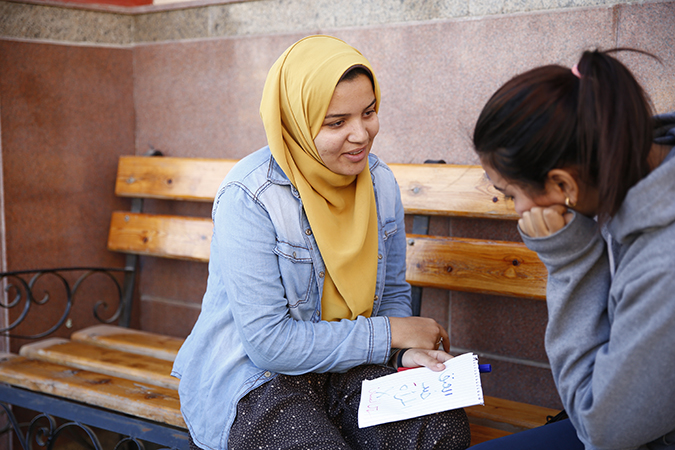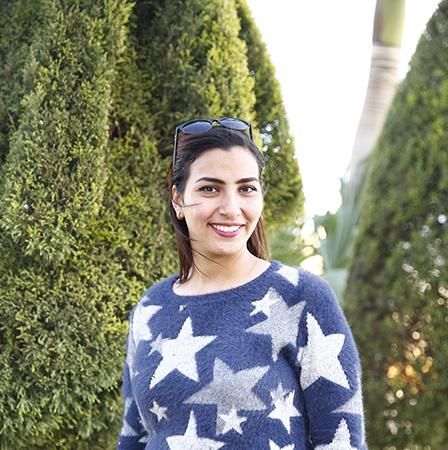Transforming Mindsets through Volunteerism
Date:
UN Women’s “Ending Violence against Women” (EVAW) programme puts a special focus on awareness raising at the community level in order to take action in preventing and responding to violence against women (VAW). With that purpose, the programme is investing in empowering and training community members, especially youth, giving them an influential role within their circles to become leaders that support gender equality and contribute to making a change within their communities.
UN Women Egypt, with the generous support of USAID Egypt, is working with five local Civil Society Organizations (CSOs) in different Egyptian Governorates (Cairo, Giza, Alexandria, Minya and Beni Suif), to raise awareness on different forms of violence against women and how to stop them. The local CSOs have gathered over 200 volunteers from the community and build their capacities on different topics such as breaking the cycle of violence, gender roles, and how to lead the process of change.
In Beni Suif, the EVAW programme has rolled out capacity building workshops for 64 young volunteers, giving them a leading role in implementing programme activities to advocate for women’s empowerment within the community. The volunteers are then equipped to carry out innovative on-ground activities such as sports days, interactive theatre, art therapy, and shadow puppets. Throughout the different interactive field activities, women and men both are introduced to the concept of gender equality and become aware of cultural myths regarding women’s role in the family and the definition of masculinity, while tackling different forms of VAW and means of its eradication.
UN Women Egypt sat with a few female volunteers in Beni Suif to learn more about their experience with EVAW and how it changed their lives and how they are impacting their community and the lives of other women.
Ibtehal Mohamed

Ibtehal Mohamed, a young 19-year-old woman, lives in a conservative rural area of Beni Suif governorate, where it is less common for girls and women to move freely and participate fully in the community. However, unlike other girls in her neighborhood, Ibtehal is privileged to have her dad who supports her to go to school and participate in interesting activities where she can learn and develop herself. She shared with us how her father is aware of the importance of empowering his daughter without blindly abiding by society’s restricting outdated traditions.
Hearing about the opportunity of volunteering with the EVAW programme, our young leader was motivated to join, not only to take part in activities that have long-term effects, but also to create positive changes in her society
After participating in various activities under EVAW, Ibtehal learned many communication and leadership skills that helped her become more vocal, knowledgeable and confident. She is now able to speak about and discuss taboo problems in her community related to sexual harassment, domestic violence, and social norms as well as to reflect on how these issues shape the needs, dreams and life expectations of girls and women. Ibtehal also learned how to be tolerant and respectful with others and is now able to draw limits when dealing with men.
The young leader now has a significant role within her community where she stands firmly against any act of violence and supports her family, friends and neighbors by guiding them on how to change their perceptions and behavior towards a gender sensitive culture with zero tolerance to violence.
Reham Ramadan

“I feel very happy when I reach out to women in villages through the EVAW activities, as this gives me the chance to help them realize their value and self-worth and that they should not belittle themselves. On the contrary, women have more responsibilities because they are the ones raising generations. Dealing with women is very useful for us, the programme’s volunteers, because we get a lot of ideas from them and they help me develop and improve myself.” - Reham Ramadan, an EVAW volunteer. Photo: UN Women/Nouran Makhlouf
Reham Ramadan was always interested in women’s empowerment. Being raised by two educated and supportive parents who encouraged her in her studies and self-development, Reham grew up with the ideas of gender equality and independence. With that in mind, Reham was determined to help other girls in her community, especially those who were subjected to society’s restrictions because of their families and traditional customs.
When Reham came across the EVAW programme, she was excited to join as a volunteer and develop herself through the various trainings in order to help create a change in her community, by promoting women’s empowerment and girls’ rights to have equal opportunities as men to access public spaces and services.
Throughout her learning process under the programme, Reham has become more aware of her rights as a woman and how she can protect herself. Through different volunteering experiences, she became much more confident and comfortable to speak publicly about different subjects relating to women, such as their role in the family and how to raise well-balanced children. The programme gave her the opportunity to publicly speak and shape perceptions of women and girls from different backgrounds and ages. This has ultimately helped her develop social and leadership skills to confidently speak about subjects related to women.
Simone Saleh

“I am like the light and I know I am exceptional. I don’t need to base my worth on other people’s opinions, because I am worthy in myself and I can develop any skill I have.” - Simone Saleh, an EVAW volunteer. Photo: UN Women/Nouran Makhlouf
Growing up in a conservative family, Simone Saleh, a 28-year-old woman in Beni Suif, was raised with many restrictions. She was unable to move around freely in public areas or to speak up and voice her thoughts and opinions. In her house, she faced constant criticism from her family regarding her actions and thoughts, and she was always pushed to believe that her limits and potential are constricted.
When Simon came across the programme, she was intrigued with its cause of ending violence against women and girls and felt that it touched her personally. She signed up and started attending the trainings and workshops that introduced her to the concepts of gender equality and women’s empowerment. Bit by bit, she began to let go of all her inner struggles that resulted from her upbringing and culture and started feeling that she was being rehabilitated. She also began to construct positive thoughts and perceptions about herself as a person and as a woman.
As she progressed in the trainings and began volunteering, Simone’s confidence built up, voicing her thoughts and opinions loudly. She became aware of her rights and value as a woman and began to have an important role amongst her family and her friends.
Unlike before, the young leader is now an influential member in her community and people want to listen to her and hear what she has learned about positive behavior and building healthy communities that value equality and refuse all forms of violence.
After seeing her grow, Simone’s family has changed their perceptions as well. They are proud of her, the achievements she has made, and the impact she has created. Simone’s family is not only supportive and respectful of her now, but they also encourage her to go and explore new opportunities to widen her scope even more.
Read in Arabic.